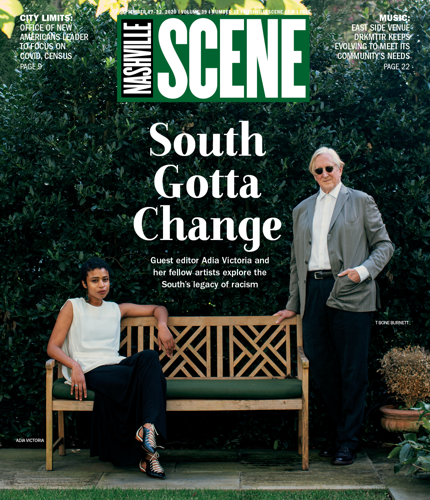The South is a land of extremes, and a land of extreme contradictions. It is a land of unparalleled beauty and unanswered questions. It is a land whose past will not pass and whose future remains singularly unclear. I wrote my song “South Gotta Change” very much feeling the weight of my own Southern identity.
This year has been the year of unanswered questions. The burden of “Why?” bears down upon us all. But I also believe this year has given us the ability to examine our lives, the systems we swim through, our relationships with one another. My hope is that this issue of the Scene challenges the way you understand the South — the culture, the people, the history, the possibility. Truly examining our environment is the first step to any meaningful change. I thank the Nashville Scene for providing space for my voice and my art. I thank you for engaging with this issue with an open heart and an open mind. —ADIA VICTORIA
Editor’s note: Adia Victoria is a poet, writer and blues musician living in North Nashville. Following the release of her song “South Gotta Change” — which addresses the South’s legacy of white supremacy — we invited her to guest edit, or curate, this Scene cover package. In this issue we’ve also included a piece from contributor Andrea Williams that discusses Victoria’s work with noted producer T Bone Burnett.
Life Down Here
Three artists describe their experiences as Black Southerners
Compiled by Adia Victoria
We’re Gonna Find a Way
Talking to Adia Victoria and T Bone Burnett about ‘South Gotta Change’ and our region’s legacy of white supremacy
By Andrea Williams
Generations for Change
Two members of one family discuss the decision to join the fight for justice
By Jackie Paul Sims and Rienne J. Hill
Reading Flannery O’Connor in the Age of COVID
Talking to writer and critic Kiese Laymon about the racial implications of the iconic Southern author’s work
By Adia Victoria
‘Untitled’
‘i was a half a mile / down the road / by the time i heard / my own clamor / mispronounced / from the mouth / of the white woman / at channel four.’
By Joshua Asante
‘Bedtime in Mississippi’
‘Here, the soil speaks through gritted teeth’
By Ciona Rouse








